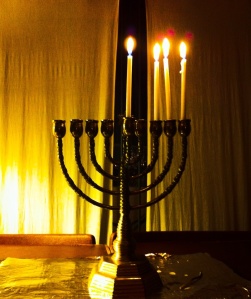
Last night was the third night of Chanukah, the Jewish 'Festival of Light', when Jews around the world place candles in a menorah (more properly, a chanukiah). The festival lasts for eight days, and you start lighting one candle on the first night, and end with lighting eight candles on the last night. The candles are lit by a candle known as the shamas.
Menorahs come in all shapes, sizes and materials: from the traditional eight branch candelabra plus the shamas candle made in brass or silver, to ultra-modern designs of great ingenuity and beauty. Essentially anything goes as long as the basics are met i.e. eight candles in some form of row plus the shamas candle, and many designers have taken up the challenge.
We have acquired several menorahs over the years. Some were gifts. Some we've inherited from parents and grandparents. A few we've bought.
Tonight we lit my favourite menorah.
Several years ago we were on holiday in the far south west of Ireland. West Cork to be precise. We were staying on a very small island in Roaringwater Bay and, as there were no shops, we had to cross over by boat to a small village on the mainland to get supplies. I say 'we', but I have to admit that is was my partner who usually went off to do the shopping while I stayed and supervised - from a very relaxed distance - the children, as they played amongst the rock pools.
Among the few shops in the village there an 'antique shop', which was actually more of a junk shop. My partner stopped one day, and looked into the shop. And there, amongst the usual bric-a-brac, was a brass menorah. She looked at the label which said: '8 branch candelabra with extra candle holder'. Amazed, and knowing there were very few if any Jews in that part of Ireland, she asked the shop owner where it had come from. The woman didn't know, and really didn't know what it was, despite the Star of David in the centre of the menorah.
So we bought it.
When we got it back to our little holiday cottage and looked at it closely we realised that it was designed to come apart. By turning the Star of David, which was attached to a long, thin screw, we could unscrew it from the heavy base, and then everything came apart. It was, of course, designed to be taken apart, and the various parts placed in a case - which had obviously disappeared somewhere along the menorah's journey to a junk shop window in West Cork.
We reckoned, after a bit of googling, that it was c. 120 years old, had probably originated in Central Europe, and the chances were that it had belonged to one of the many thousands of families - like our own families - who came to the then British Isles and beyond to escape persecution and to seek a new life.
Of course we'll never really know the real story. But as I watch that old brass menorah glow as the candles burn and flicker, I feel a extraordinary link to the past: a link in a chain that remains - despite the tribulations and tragedies of history - unbroken.